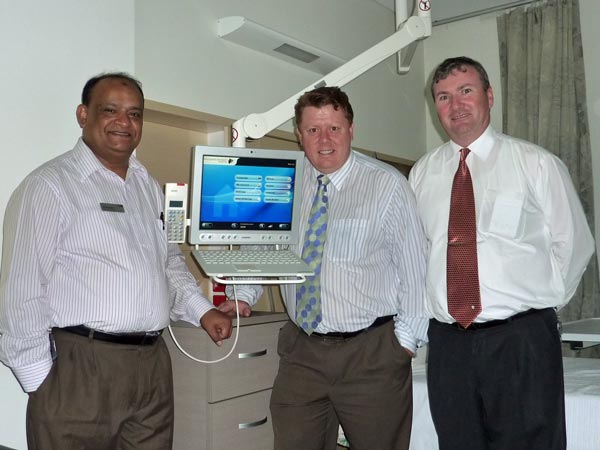
Macquarie University Hospital’s zero-tolerance approach to infection control is supported by rigorous housekeeper training and a serious investment in the appropriate equipment and tools. Following a visit to this Sydney healthcare site, INCLEAN editor Alan Hardcastle asks the obvious question, ‘is this Australia’s cleanest and most hygienic hospital?’

Opened mid-2010 and owned by Macquarie University, Macquarie University Hospital is a 183-bed facility with 12 operating theatres. It is complemented with a co-located Clinic that houses medical specialists and a medical a school.
The in-house cleaning team is headed by executive housekeeper Ali Khondukar, who reports to manager, hotel services, Kevin Kelly. It’s been a happy professional working relationship for some 10 years, both executives having worked together on other major Sydney healthcare and hospitality sites.
Kelly joined the Hospital in mid-March 2010 and Khondukar started late April. “The Hospital building had not been finished and we had to work around and about what was still a construction site,” pointed out Kelly.
“It was 12 to 14 hour work days for both of us. We had to do workplace assessments; staff recruitment; start up supplier relationships to source the right products; and then implement training programs,” he added.
Kelly, who is also responsible for a number of other critical services including catering, and Khondukar had to adapt to the Hospital’s design but seemingly that was not an issue.
“The Macquarie University Hospital is a dream come true,” enthused Khondukar. “In my 22 years of working in the cleaning industry I always wanted a role where I got what I wanted and needed to deliver the very best results. Now I do!”
Infection control is Khondukar and the housekeeping team’s priority at all times and that means a 0% rate.
Of course Macquarie University Hospital is new, and is positioned at the hospital market’s premium end. Specialising in neurological and oncological cases, the hospital has Australia’s only gamma knife nuclear medicine machine.
It has only single rooms and each one has state-of-the-art fittings including a touchscreen ‘cockpit’ that allows patients to select a range of services including television, pay TV, Skype, and meal choices. In what is a paperless facility, medicos use the ‘cockpit’ to read and update patient records. All rooms have a small fridge too.
However, it’s the day-to-day more basic room and ward fittings that are not sophisticated but are designed with hygiene in mind.
Shower curtains and toilet brushes are anti-bacterial while there is a new toilet roll for every new patient. Top line cleaning and waste trolleys are fitted with sensors so that management knows at any one time where they are located. And linen cupboards are in handy locations so that staff don’t waste time walking back and forth.
However, the real hygiene message is imparted with a ‘no mops and buckets’ policy. The best designed and made cleaning tools and microfibre cloths are the backbone of the cleaning system.
Importantly, a ‘fail safe’ microfibre cloth cleaning procedure ensures that cloths are at all times genuinely clean at the start of a shift. The cloths are impregnated with anti-bacterial silver; and then cleaned in a thermal and disinfectant process. The hospital has its own large washer/dryer dedicated to microfibre cloth hygiene.
Cleaning tools are stored off the ground at all times and cleaning trolleys are complemented with custom-designed floor mat and sharps bin trolleys.
“Our hospital cleaning, carried out by 27 full time equivalent employees, is carried out 24/7 while the Clinic – which is mainly office cleaning – starts at 6pm,” noted Khondukar.
“Some of our team are specially trained to clean the operating theatres, and they work on those specialist tasks from mid night,” he added.
Cleaners trained to the hospital’s regime
The Macquarie University Hospital’s cleaners are trained to clean ‘Khondukar’s way’. “Ideally, new people joining us have no previous commercial cleaning experience so that we do not have to spend extra time re-training them out of bad habits learned on other sites.
“Induction includes practical training on all the equipment and they learn to clean the way our Hospital demands it,” Khondukar emphasised. Each cleaner knows exactly how long every cleaning task should take to do effectively and efficiently.
At the end of each shift, cleaners spend the last 10 minutes preparing the cleaning trolleys for the next shift. That means little to no time is lost by the fresh crew.
Monthly inspections are carried out together by supervisors and nursing unit managers, thereby ensuring that all housekeeping and clinical issues are addressed.
A large ‘waste minimisation’ room reflects the hospital’s commitment to waste reduction. It achieves a more than 90% recycling rate that means less than 10% of the facility’s total waste goes into landfill.
The close working relationship between hotel services’ teams means more efficiencies across all services. However, it’s the disciplined approach to a maintaining a first class hygiene system that will be the Hospitals’ first line of defence in an ongoing battle with HAIs.
www.muh.org.au